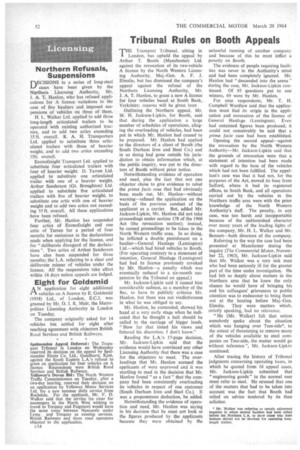Tribunal Rules on Booth Appeals
Page 54

If you've noticed an error in this article please click here to report it so we can fix it.
'THE Transport Tribunal, sitting in London, has upheld the appeal by Arthur T. Booth (Manchester) Ltd. against the revocation of its two-vehicle A licence by the North Western Licensing Authority, Maj.-Gen. A. F. J. Elmslie, but has dismissed the company's appeal against the refusal of the Northern Licensing Authority, Mr. J. A. T. Hanlon, to grant a new A licence for four vehicles based at South Bank, Yorkshire; reasons will be given later.
Outlining the Northern appeal, Mr. M. H. Jackson-Lipkin, for Booth, said that during the application a large number of schedules of operations, alleging the overloading of vehicles, had been put in which Mr. Hanlon had caused to be preparea. Mr. Hanlon had applied to the directors of a client of Booth (the South Durham Iron and Steel Co.) and in so doing had gone outside his jurisdiction to obtain information which, at the public inquiry, was put to the directors of Booth without prior notice.
Notwithstanding evidence of operation and need, plus the fact that not one objector chose to give evidence to rebut the prima fade case that had obviously been made out, Mr. Hanlon—without warning—refused the application on the basis of the previous conduct of the applicant as a carrier. But, added Mr. Jackson-Lipkin, Mr. Hanlon did not take proceedings under section 178 of the 1960 Act (the revocation section); instead, he caused proceedings to be taken in the North Western traffic area. In so doing, he inflicted a double punishment on a haulier—General Haulage (Lemington) Ltd.—which had hired vehicles to Booth. (For operating contrary to a statement of intention, General Haulage (Lemington) had had its licence previously revoked by Mr. Hanlon—a penalty which was eventually reduced to a six-month suspension by the Tribunal on appeal.)
Mr. Jackson-Lipkin said it caused him considerable sadness, as a member of the Bar, to have to publicly criticize Mr. Hanlon, but there was not vindictiveness in what he was obliged to say.
Mr. Hanlon, he contended, showed his hand at a very early stage when he indicated that he thought a halt should be called to the carriage of bigger loads. "How far that tinted his views and fettered his discretion, I don't know."
Reading the L.A.'s 17-page decision, Mr. Jackson-Lipkin said that the evidence would have convinced any other Licensing Authority that there was a case for the objectors to meet. The overloadings that Mr. Hanlon accused the applicants of were unproved and it was startling to read in the decision that Mr. Hanlon found " as a fact" that the company had been consistently overloading its vehicles in respect of one customer (South Durham Iron and Steel Co.). It was a preposterous deduction, he added.
Notwithstanding the evidence of operation and need, Mr. Hanlon was saying in his decision that he must not look at the figures produced by the applicants because they were obtained by the unlawful running of another company and because of this he must inflict a penalty on Booth.
The evidence of people requiring facilities was never in the Authority's mind and had been completely ignored. Mr. Hanlon had "descended into the arena" during the case, Mr. Jackson-Lipkin continued. Of 95 questions put to one witness, 69 were by Mr. Hanlon.
For nine respondents, Mr. T. H. Campbell Wardlaw said that the application must find its origin in the application and revocation of the licence of General Haulage (Lemington). Even had untainted figures been produced, it could not conceivably be said that a prima facie case had been established.
Opening the second appeal—against the revocation by the North Western Authority—Mr. Jackson-Lipkin said that the grounds of revocation were that a statement of intention had been made with regard to the base of the vehicles which had not been fulfilled. The appellant's case was that it had not, for the purposes of the Act, moved its base from Salford, where it had its registered offices, to South Bank, and all operations carried out by the vehicles in the Northern traffic area were with the prior knowledge of the North Western Authority's staff. The penalty, in any case, was too harsh and insupportable because of the unblemished character over many years of the leading lights of the company, Mr. H. L. Walker and Mr. Bennett—both directors of the company.
Referring to the way the case had been presented at Manchester during the inquiry (The Commercial Motor, November 22, 1963), Mr. Jackson-Lipkin said that Mr. Walker was a very sick man who had been seriously ill for the greater part of the time under investigation. He had felt so deeply about matters in the Northern area that he knew the only chance he would have of bringing his and his colleagues' grievances to public attention was to endeavour to bring them out at the hearing before Maj.-Gen. Elmslie. They were matters which, strictly speaking, had no relevance.
"He (Mr. Walker) felt that unless somebody spoke about the situation which was hanging over Teesside*, to the extent of threatening to remove many of the vehicles available to steel companies on Tees-side, the matter would go without reference", Mr. Jackson-Lipkin continued.
After tracing the history of Tribunal judgments concerning operating bases, in which he quoted from 16 appeal cases, Mr. Jackson-Lipkin submitted that "engineering goods" in the normal user must refer to steel. He stressed that one of the matters that had to he taken into account was the fact that Booth had relied on advice tendered by its then solicitor.
Mr. Walker was referring to certain adjourned inquiries in which several hauliers had been called before the Northern L.A. to show cause why their licences shipuld not be revoked for operating longlength trailers.
















































































































































